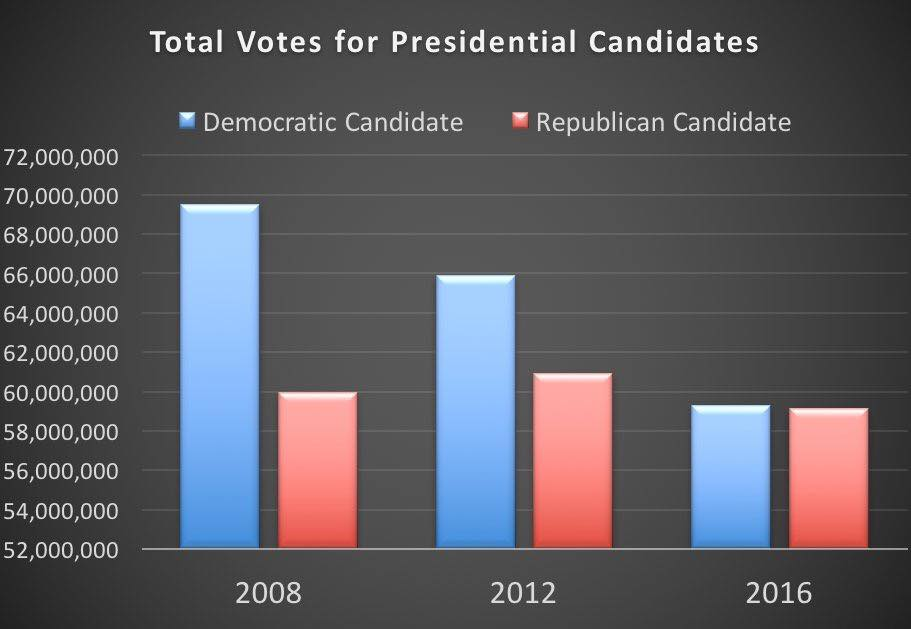Interested by this? Share it on social media. Join our monthly e-newsletter to keep up to date with our latest research and events. And check out our Friends Programme to find out how you can help our work.
An awful lot of complaint and fear has arisen over so-called post-truth politics. It was an accusation levelled against the Brexit campaigners and certainly against future President Donald Trump. There are good reasons for these complaints. While any statistic or “fact” can be spun or interpreted in a number of ways that make it difficult to say categorically if such a claim is true or false, nonetheless when a respected fact checker states that Trump is spinning falsehoods almost 70% of the time there is reason for concern.
However, I do not believe Trump won because of his lies. Just as I don’t believe Brexit won the day because of some creative claims about how much money would be available to the NHS. In both cases they won because their opponents have lost any sense of vision. Clinton’s supporters insist on calling her politics progressive, but it is difficult to see how that claim is sustainable. There was nothing new on offer from her campaign. After eight years of Democratic presidency that promised much but has delivered mixed results she didn’t seem to have much new to say. A campaign that boiled down to “more of the same, and at least she isn’t a racist” isn’t a hugely inspiring message.
Perhaps that seems unfair, and you do believe that she was an inspiring candidate. The numbers as shown here in a graph from Professor Yanagizawa-Drott on Twitter aren’t on your side:

Overall Clinton won 9.3 million fewer votes than Obama in 2008. Trump didn’t win due to a surge of new Republican voters (he won fewer votes than either McCain or Romney), he won because when it came down to it people didn’t see anything in Clinton worth voting for in the way they did for her predecessor.
Although Brexit and Trump votes were in some ways quite different one of the interesting features that they have in common is whether they are optimistic or pessimistic about the way in which their country is going.
Lord Ashcroft’s polling of the US reveals the stark differences between the two parties. The trend among Trump’s voters was to be disproportionately sure that life in America is getting worse, while Clinton’s tended to believe the opposite. The overall national trend was slightly closer to Trump’s view than Clinton’s.
Echoes of my Brexit polling in this question on differences in attitude between Democrats and Republicans: pic.twitter.com/cae2rMax8a
— Lord Ashcroft (@LordAshcroft) 7 November 2016
It was a similar story when it came to Brexit. Again if you thought life was getting worse, or that Britain was a worse place than it had been decades before you were disproportionately likely to vote Brexit. You were also correspondingly likely to reject about every possible “liberal” trait going, as this polling from Lord Ashcroft demonstrates. Overall nearly three quarters (73%) of remainers think life in Britain is better today than it was 30 years ago; a majority (58%) of those who voted to leave say it is worse.
Both votes are symptomatic of a broader crisis in Western political values. Western political philosophies all owe to Christianity a firm belief that the world ought to be getting better. From the nineteenth century “Whig history” approach of seeing all history as a development to the optimal civilized British state, to the Marxist view of the inevitability of a communist utopia, all share this teleological belief in a world aiming towards a goal that is better than where it was before. They are seeing a coming Kingdom of God established on Earth, even if some of them have stripped out the God part.
Liberalism is no different in this sense. The underlying assumption is that democratic liberalism will simply advance onwards. To backslide is irrational. Barring occasional blips, people on the whole will only ever become more free, more tolerant, and more “progressive”. Hence Francis Fukuyama could famously and confidently proclaim the “end of history”. How could it be otherwise? The world of 1989 was becoming universally democratic and liberal (or at least so it seemed), progress was assured.
Trump’s victory shows in sharp relief the failure of these political visions. A majority no longer believe the world is getting better. When a leader or campaign gives voice to that sense of “being left behind” and seeing a world that is not improving, at least for many people, they are prepared to vote for that protest call.
What is striking is that there seems to be no positive vision to be put forward against this rebellion. The Remain camp stuck to “Project Fear” and hoped economics would trump this sense of disillusion and abandonment. Clinton opted for stressing her own competence, appealing to minority groups, and pointing out that Trump was a misogynist, racist, and incompetent candidate. She’s right of course, but that wasn’t enough. The secular utopian liberal Kingdom of God, like its Marxist predecessor, and its Christian counterpart that might yet outlast both, no longer convince the majority of the population.
Until there is a new, genuinely powerful and positive vision for the West of the future these populist rebellions are going to keep coming. It would be a brave punter who now rules out victories for Marine Le Pen and Geert Wilders in the coming months. It’s not as if the Dutch or French establishments have developed a counter vision any more than Clinton or Cameron did.
Ben Ryan is Researcher at Theos @BenedictWRyan
Image from Pixabay available under Creative Commons 2.0







